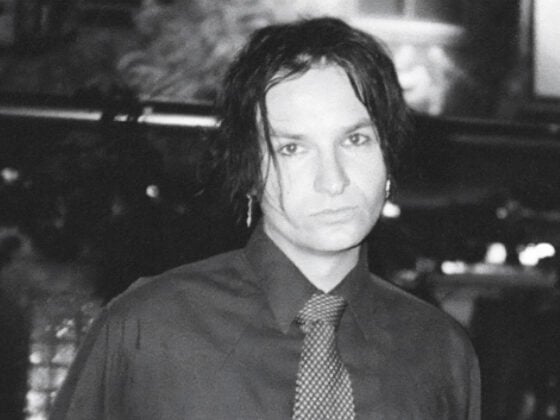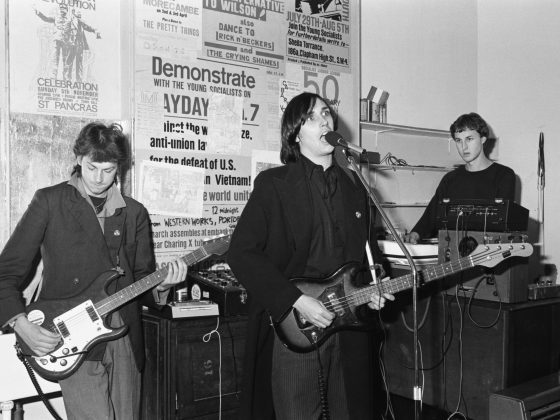Does it make you click
Now it’s time to go deep
Way deep like a freak
Taste my analog kick
Paradox Obscur practice exorcism with their thundering new album, IKONA. Every track on this offering thrums like a séance in a server room: wires glowing, faith burning, voltage baptized in reverb. It’s an album that treats rhythm as ritual and melody as voltage made flesh. Somewhere between devotion and data, Kriistal Ann and Toxic Razor have built a shrine to electricity itself.
The record opens like a controlled detonation. Machines breathe. Ann’s voice arrives with chilling poise: half oracle, half operator, cutting through the mix with the grace of someone dictating prophecy through a radio storm. Razor’s drum programming snaps like a metronome possessed, rigid yet radiant, guiding every track as if time itself were under surveillance.
Switch to Love moves with the elegance of surrender disguised as command. Ann’s phrasing carries the faint ache of withheld confession, syllables bent just enough to suggest danger. Razor’s synths shimmer in metallic waves, rising and folding back in perfect discipline. There’s a point mid-track where the bassline drops an octave…subtle, seismic, intimate, and the whole thing feels like a heartbeat remembering what it’s for.
Then the night takes over. Rodeo rides the pulse straight into delirium: a club anthem built for bodies that forgot their names somewhere between champagne and chaos. The beat is relentless, stomping like stilettoed cavalry across the dancefloor. It’s a hymn to human excess rendered in precision timing; a spectacle of heat disguised as geometry.
Vulgar Sequence turns the temperature inward. The song stalks itself, circling the subject of control, power, and the strange ecstasy of domination. Razor’s synth bass growls low and deliberate, each note snapping against Ann’s measured delivery. She sings like someone documenting addiction under oath, voice cool against the fever. It’s a study in seduction as system failure.
And then Like a Freak: a masterpiece of analogue purity. No computers, no presets, just the hum of machines coaxed into obedience. The rhythm is skeletal, stripped to its mineral essence, and every frequency feels alive, unstable, gloriously wrong. The song stalks forward, like it’s daring you to blink first. The accompanying black and white video, directed by Pavel Vishnevsky, stars a spirited nighttime performance from dancer Nicola Di Pierro. Watch below – we dare you to keep those toes from tapping.
Watch the video for “Like A Freak” below:
Iconic B worships the body as myth; the synths hiss like overheated chrome, percussion clattering in rhythmic spasms. Ann sounds both sanctified and spent. Love? Pffft, that’s combustion. By Luminous, language itself dissolves. The track is pure motion: cascading arpeggios orbiting a single, furious idea: speed. It’s music that feels engineered for nights when thought becomes noise.
Then Lose This Feeling, their boldest sleight of hand; a trance anthem inverted. Paradox Obscur strip the genre to its raw voltage, replacing sugar with smoke. Ann’s vocals hover like a ghost caught between broadcast frequencies while Razor’s synthesizers move with mathematical grace. It’s beautiful, but never polite. Personal closes the album like a final transmission from the edge of obsession. Ann’s voice trembles not with fear but devotion’s exhaustion. She sings of love as contagion, of intimacy as chemical warfare. Razor answers with machinery that sounds almost merciful, until it cuts out mid-breath, leaving silence sharp enough to bleed.
IKONA is an act of faith in the human hand. Every track testifies to the friction between impulse and control, analog and instinct, desire and design. Across IKONA, Paradox Obscur conduct themselves with the discipline of economists and the mania of evangelists. Every decision feels audited. Every mistake feels deliberate. It’s music as system shock…proof that even precision can ache, and machines can dream in flesh tones.
Listen to IKONA below and order the album here.
The music of Paradox Obscur occupies a space outside fashion and forecast. It’s both forward-facing and ancient in impulse; an act of rebellion against the algorithmic predictability of modern electronic music. On stage, they summon that same energy into motion. Paradox Obscur’s performances at Wave Gotik Treffen, Monitor, Waveteef, and Kalisz Fest, as well as their South American tour, have earned them a reputation for ferocity.
Their discography traces a steady ascent through Europe’s underground circuits, but their reach extends into cinema. Paradox Obscur’s compositions appeared in Denis Côté’s 2022 French-Canadian film That Kind of Summer, and in 2023 they scored Peppermint Diesel 20%, a short by Mariangela Pluchino, an honorary Berlinale Talents alumna. The latter will premiere on Finnish broadcaster YLE in 2025, alongside a slate of international festivals.
Follow Paradox Obscur:
















 Or via:
Or via: